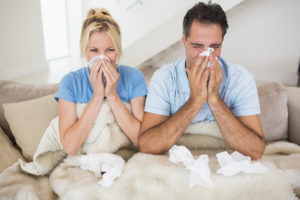OSHA Guidelines on Mold in the Workplace

OSHA Guidelines on Mold in the Workplace
Residential mold problems often make the news headlines, but the stories don’t end there. Mold removal in New Jersey is equally important in office buildings, restaurants and other workplaces. While there are currently no federal regulations in place, OSHA offers helpful guidelines for dealing with workplace mold.
When Does Mold Become a Problem?
Mold spores are constantly present in the air, both indoors and outdoors. They generally have no effect unless they begin to colonize on an interior surface. If left untreated, mold can eventually cause serious health and structural issues.
What Causes Mold to Grow?
Water is the lifeblood of mold. Growth occurs in areas with excessive moisture, where a mold spore is more likely to come into contact with dampness. Risky workplace conditions include leaky pipes or roofs, and malfunctioning HVAC systems.
How Does Mold Impact Health?
Mold produces allergens that can trigger a number of upper respiratory symptoms such as runny nose, watery eyes and scratchy throat. While people who suffer from allergies are most susceptible, those without allergies can still develop symptoms after prolonged exposure.
How Can Mold Be Prevented?
– Clean up water spills, leaks and floods immediately and repair any corresponding damage.
– Make sure that kitchens, bathrooms and moisture-generating appliances are properly vented according to code.
– Have HVAC systems inspected and maintained regularly.
– Schedule a professional mold assessment to identify risk factors and confirm the presence of mold.
Safe and Effective Mold Removal in New Jersey
Our proprietary MoldExterm program offers eco-friendly mold remediation and prevention with minimal disruption to your workplace. Contact Stern Mold to schedule a free mold inspection by one of our experienced technicians.

